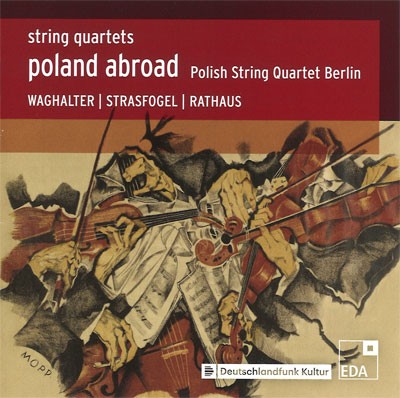Bote & Bock
In an impromptu confrontation with Ignace Strasfogel’s undated First String Quartet, presumably written around 1928, nobody would believe that it is the music of an eighteen- or nineteen-year-old. It occupies a special position within his "early works" in that, in the context of an oeuvre devoted largely to his own instrument, the piano, Strasfogel turned for the first time to the string quartet, a genre that was not "native" to him. The young Strasfogel breaks on the formal level with all conventions by means of the two-movement layout of his quartet. Astonishing for one of Schreker's favorite pupils, who held his teacher in high esteem even into old age, is the stylistic proximity to the Second Viennese School. Nothing is to be heard here of Schreker's impressionistically refined, late-romantic tonal aura. Instead, Strasfogel confidently, and just as unorthodoxly as Berg, makes use of the twelve-tone technique, writes a radical, yet finely nuanced counterpoint, and suspends the prioritization between the main voice and the accompaniment by means of absolute linearity. Pure triads function only as punctuation marks. That which begins as a slow movement (Adagio) becomes increasingly imbued with scherzo elements and ultimately leads into a fugue (Allegro) that is simultaneously a development in which the lyrical opening theme is contrapuntally juxtaposed with two further, sharply contrasting themes. Everything here, crowded into the smallest space, is thematic, and yet the texture is distinctly transparent at all times. The energy that results from the extreme densification of the first movement, in which the tradition remains tangible at most in the "neo-baroque" conception of the themes (head motif as well as fortspinnung or sequencing, respectively), literally erupts in the expansive structure of the second movement. Here we encounter "endless melodies" of a different texture, but of a nature similar to late Schubert: wide arches carried by finely chased rhythmic patterns in the secondary parts that are always also thematic work. Strasfogel shows himself to be avant-garde above all in the emancipation of the melodic lines from the measure-dictated meter – the combination of polytempo and polymeter in the second movement numbers among the most exciting things to be found in the string quartet literature of this epoch.
Frank Harders-Wuthenow (translation: Howard Weiner)

Polish String Quartet Berlin
eda 043 (World premiere recording)
